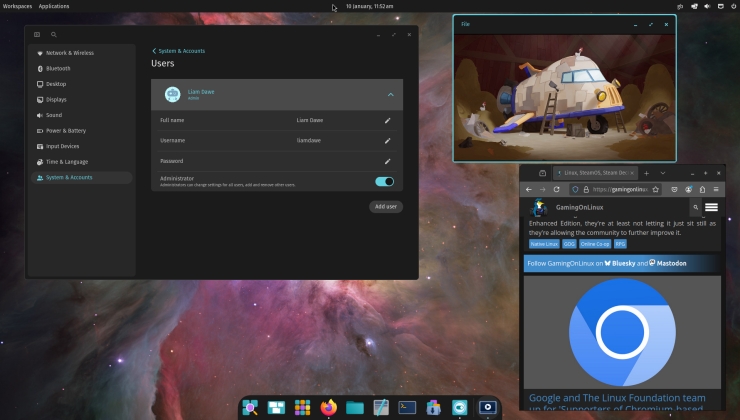Sponsored by Red Hat, the Fedora Linux distribution has today released Fedora 33 which brings in numerous improvements for desktop users.
For desktop users, Fedora Workstation is what you're looking for if you want what they claim is a "just works" Linux experience. Fedora 33 pulls in GNOME 3.38 'Orbis' which by itself is a pretty big upgrade, see our previous overview on that here. They're also now using the BTRFS filesystem as the default, which is again quite a major change that includes lots of advanced features for those who want it but for desktop users it shouldn't be a noticeable change. The Fedora team mention that the switch to BTRFS is laying the foundation to build upon in future releases.
 Pictured - a fresh test install of Fedora 33.
Pictured - a fresh test install of Fedora 33.
This release also brings in an animated background (based on the time of day) by default which is pretty slick looking. As part of Fedora's "First" mission they try to include all the latest and greatest software and with Fedora 33 you get the likes of Python 3.9, Ruby on Rails 6.0, and Perl 5.32 as default. In their KDE edition, they've also enabled the EarlyOOM service by default to improve the user experience in low-memory situations.
If you make use of the Wine compatibility layer, this release should also now use the Direct3D to Vulkan translation layer DXVK as the default instead of wined3d which should give much better performance in Windows games run through it. As after we covered the proposal, it was approved. Fedora 33 ships with Wine 5.20 and DXVK 1.7.2.
You can see the release announcement here, release notes here and download from here.
But I appreciate that Fedora is following a trail hollowed out by slightly smaller distributions. Now it's time for LLVM / Clang by default.
Last edited by DamonLinuxPL on 27 Oct 2020 at 3:44 pm UTC
This release also brings in an animated background
This is the most fascinating one for me! Thanks Red Hat & Fedora team!
This release also brings in an animated background
This is the most fascinating one for me! Thanks Red Hat & Fedora team!
Is this fromm Gnome 3.38? or does another package handle the animated background, am curiousabout doing this on my install.
This release also brings in an animated background
This is the most fascinating one for me! Thanks Red Hat & Fedora team!
Is this fromm Gnome 3.38? or does another package handle the animated background, am curiousabout doing this on my install.
I've no idea... But i've used Komorebi before.
https://github.com/Komorebi-Fork/komorebi
Uhm.. GNOME have shipped with that feature for years. I'm guessing this is just Fedora shipping with one of them as the default for the first time?This release also brings in an animated background
This is the most fascinating one for me! Thanks Red Hat & Fedora team!
Is this fromm Gnome 3.38? or does another package handle the animated background, am curiousabout doing this on my install.
Check the backgrounds in GNOME settings. The ones with a little clock in the corner changes.
Edit: This feature shipped in GNOME 3.4, way back in 2012.
Last edited by whizse on 27 Oct 2020 at 7:40 pm UTC
BTRFS as default on a desktop distro... guess we'll find out how that experiment turns out before long.
openSUSE has been using it by default for years. It works fine and is a lifesaver with snapper and the ability to boot previous snaps.
BTRFS as default on a desktop distro... guess we'll find out how that experiment turns out before long.
openSUSE have done done it for a few years now, seems to generally work fine. It is also better tuned to be used as a default for the general masses than ext4 these days since it allows things like checksumming, compression, snapshots and copy-on-write while still being a widely used and integrated system compared to say ZFS.
Your average user or gamer will not be limited by the performance difference compared to EXT4 or XFS and can in some cases actually benefit from compression for reduced load-times on rotational drives.
For average Joe it doesn't really matter which file system crashes, they are not going to be fixing attempting to fix it regardless so the confusing docs are not really an issue either.
With my support-technician-hat on, I think it is a rather good default, and those that know they have specific demands also have the know-how to choose one that suits our workload better.
openSUSE has been using it by default for years. It works fine and is a lifesaver with snapper and the ability to boot previous snaps.
openSUSE have done done it for a few years now, seems to generally work fine. It is also better tuned to be used as a default for the general masses than ext4 these days since it allows things like checksumming, compression, snapshots and copy-on-write while still being a widely used and integrated system compared to say ZFS.
I would like to third this argument plus add that being able to turn off COW in btrfs submodules is really useful for stuff like /var.
If I had a cow it would probably be useful to be able to turn it off.openSUSE has been using it by default for years. It works fine and is a lifesaver with snapper and the ability to boot previous snaps.
openSUSE have done done it for a few years now, seems to generally work fine. It is also better tuned to be used as a default for the general masses than ext4 these days since it allows things like checksumming, compression, snapshots and copy-on-write while still being a widely used and integrated system compared to say ZFS.
I would like to third this argument plus add that being able to turn off COW in btrfs submodules is really useful for stuff like /var.
For other complaints; I'm still waiting on docker fixing cgroup2 or having podman-compose on a production level capability.
I (usually) love fedora, and I love the changes introduced in 33. But the post, and comments so far, seem to miss the most important and controversial changes this iteration includes (for me); systemd-resolved as a default dns daemon.What's wrong with it?
I believe I have it in Ubuntu 20.04, but I use stubby and DoT, so it was as simple as about 2 lines in terminal to switch to stubby.
Truth be told, stubby may actually crash about once a month and I have to restart it to get back to Internet.
Maybe I need to learn how to use systemd-resolved after all.
Last edited by omicron-b on 28 Oct 2020 at 2:44 am UTC
I (usually) love fedora, and I love the changes introduced in 33. But the post, and comments so far, seem to miss the most important and controversial changes this iteration includes (for me); systemd-resolved as a default dns daemon.What's wrong with it?
I believe I have it in Ubuntu 20.04, but I use stubby and DoT, so it was as simple as about 2 lines in terminal to switch to stubby.
Truth be told, stubby may actually crash about once a month and I have to restart it to get back to Internet.
Maybe I need to learn how to use systemd-resolved after all.
Various compatibility issues: https://pagure.io/fesco/issue/2476
I used it for a while on Arch; FWIW I thought the configuration was really tidy & simple -- though I had to switch back because *some* application -- can't remember what for the life of me, sorry -- kept breaking.
I (usually) love fedora, and I love the changes introduced in 33. But the post, and comments so far, seem to miss the most important and controversial changes this iteration includes (for me); systemd-resolved as a default dns daemon.
For other complaints; I'm still waiting on docker fixing cgroup2 or having podman-compose on a production level capability.
Do you know the current status of docker and cgroups2?
I use docker quite frequently, Fedora32 sets the needed kernel arguments for still having support for older cgroups when installing docker. I guess this is still the same with Fedora33?
Thank you for reply, tested systemd-resolved on Ubuntu 20.04 and DoT just fails with my selfhosted server:I (usually) love fedora, and I love the changes introduced in 33. But the post, and comments so far, seem to miss the most important and controversial changes this iteration includes (for me); systemd-resolved as a default dns daemon.What's wrong with it?
I believe I have it in Ubuntu 20.04, but I use stubby and DoT, so it was as simple as about 2 lines in terminal to switch to stubby.
Truth be told, stubby may actually crash about once a month and I have to restart it to get back to Internet.
Maybe I need to learn how to use systemd-resolved after all.
Various compatibility issues: https://pagure.io/fesco/issue/2476
I used it for a while on Arch; FWIW I thought the configuration was really tidy & simple -- though I had to switch back because *some* application -- can't remember what for the life of me, sorry -- kept breaking.
$ dig youtube.com
; <<>> DiG 9.16.1-Ubuntu <<>> youtube.com
;; global options: +cmd
;; connection timed out; no servers could be reachedSame server works via systemd-resolved without DoT, port 53, with DoT via stubby, port 853 and with DoT via my router, 192.168.Х.Х. port 53 (but I'm not always at home, so I set up DoT also on laptop).
Will try once again on Ubuntu 22.04 I guess
I (usually) love fedora, and I love the changes introduced in 33. But the post, and comments so far, seem to miss the most important and controversial changes this iteration includes (for me); systemd-resolved as a default dns daemon.
For other complaints; I'm still waiting on docker fixing cgroup2 or having podman-compose on a production level capability.
Do you know the current status of docker and cgroups2?
I use docker quite frequently, Fedora32 sets the needed kernel arguments for still having support for older cgroups when installing docker. I guess this is still the same with Fedora33?
Not really. Not long ago I saw some issues on GitHub and seemed that they were being worked on, but no offical word on this.
Haven't upgraded to f33 yet, need to find some spare time at work first :D
BTRFS as default on a desktop distro... guess we'll find out how that experiment turns out before long.
It's been stable for every day use for a while now. It's just the whining of edge cases users and the anti-Facebook crowd has been drowning out it's achievements. If all goes well we'll see the other big distro switch as well.












 An idiots guide to setting up Minecraft on Steam Deck / SteamOS with controller support
An idiots guide to setting up Minecraft on Steam Deck / SteamOS with controller support How to install extra software, apps and games on SteamOS and Steam Deck
How to install extra software, apps and games on SteamOS and Steam Deck
See more from me